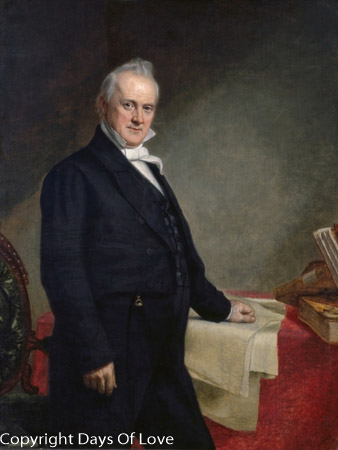Queer Places:
James Buchanan Birthplace, Mercersburg, PA 17236, Stati Uniti
Dickinson College, 28 N College St, Carlisle, PA 17013, Stati Uniti
Woodward Hill Cemetery, 508 S Queen St, Lancaster, PA 17603, Stati Uniti
 The
only president to remain a bachelor, James Buchanan (April 23, 1791 – June 1, 1868)'s personal life has attracted
great historical interest.
His biographer Jean Baker argues that Buchanan was
asexual
or
celibate.
Several writers have put forth arguments that he was
homosexual, including sociologist
James W. Loewen,[93][94]
and authors Robert P. Watson and Shelley Ross.
The
only president to remain a bachelor, James Buchanan (April 23, 1791 – June 1, 1868)'s personal life has attracted
great historical interest.
His biographer Jean Baker argues that Buchanan was
asexual
or
celibate.
Several writers have put forth arguments that he was
homosexual, including sociologist
James W. Loewen,[93][94]
and authors Robert P. Watson and Shelley Ross.
In 1818, Buchanan met Anne Caroline Coleman at a grand ball at Lancaster's
White Swan Inn, and the two began courting. Anne was the daughter of the
wealthy iron manufacturer (and protective father) Robert Coleman and
sister-in-law of Philadelphia judge
Joseph Hemphill, one of Buchanan's colleagues from the House of
Representatives. By 1819, the two were engaged, but could spend little time
together; Buchanan was extremely busy with his law firm and political projects
during the
Panic of 1819, which took him away from Coleman for weeks at a time.
Conflicting rumors abounded. Some suggested that he was marrying for her
money, because his own family was less affluent, or that he was involved with
other women. Buchanan never publicly spoke of his motives or feelings, but
letters from Anne revealed she knew of several rumors.[97]
Coleman broke off the engagement, and soon afterward, on December 9, 1819,
died suddenly.
Buchanan wrote her father for permission to attend the funeral, claiming "I
feel happiness has fled from me forever";[99]
However, Robert Coleman refused permission.[100]
After Coleman's death, Buchanan never courted another woman, nor seemed to
show any emotional or physical interest. An unfounded rumor circulated of an
affair with President Polk's widow,
Sarah Childress Polk.[101]
Some believe that Anne's death served to deflect awkward questions about
Buchanan's sexuality and bachelorhood.[99]
During Buchanan's presidency, his orphaned niece,
Harriet Lane, whom he had adopted, served as official White House hostess.[102]
Buchanan had a close and intimate relationship with
William Rufus King, an
Alabamian
politician who briefly served as vice president under
Franklin Pierce. Buchanan and King lived together in a Washington
boardinghouse for many years, from 1834 until King's departure for France in
1844. King referred to the relationship as a "communion",[101]
and the two attended social functions together. Contemporaries also noted the
closeness. Andrew Jackson called King "Miss Nancy" and prominent Democrat
Aaron V. Brown referred to King as Buchanan's "better half", "wife" and
"Aunt Fancy" (the last being a 19th-century euphemism for an effeminate man),[103][104]
Sociologist Loewen noted that "wags" described Buchanan and King as "Siamese
twins", that Buchanan late in life wrote a letter acknowledging that he might
marry a woman who could accept his "lack of ardent or romantic affection", and
also that Buchanan was expelled from his Lancaster church, reportedly for
pro-slavery views acquired during the King relationship.[106][107]
Catherine Thompson, the wife of cabinet member
Jacob Thompson, later noted that "there was something unhealthy in the
president's attitude".[101]
King became ill in 1853 and died of tuberculosis shortly after Pierce's
inauguration, four years before Buchanan became president. Buchanan described
him as "among the best, the purest and most consistent public men I have
known."[101]
Jean Baker's biography of Buchanan notes that his and King's nieces may have
destroyed some correspondence between Buchanan and King. She opines that the
length and intimacy of their surviving letters (one written by King upon his
ambassadorial departure being specifically cited by Loewen) illustrate only
"the affection of a special friendship."
My published books:


BACK TO HOME PAGE

- https://en.wikipedia.org/wiki/James_Buchanan#References
 The
only president to remain a bachelor, James Buchanan (April 23, 1791 – June 1, 1868)'s personal life has attracted
great historical interest.[91]
His biographer Jean Baker argues that Buchanan was
asexual
or
celibate.[92]
Several writers have put forth arguments that he was
homosexual, including sociologist
James W. Loewen,[93][94]
and authors Robert P. Watson and Shelley Ross.[95][96]
The
only president to remain a bachelor, James Buchanan (April 23, 1791 – June 1, 1868)'s personal life has attracted
great historical interest.[91]
His biographer Jean Baker argues that Buchanan was
asexual
or
celibate.[92]
Several writers have put forth arguments that he was
homosexual, including sociologist
James W. Loewen,[93][94]
and authors Robert P. Watson and Shelley Ross.[95][96]
